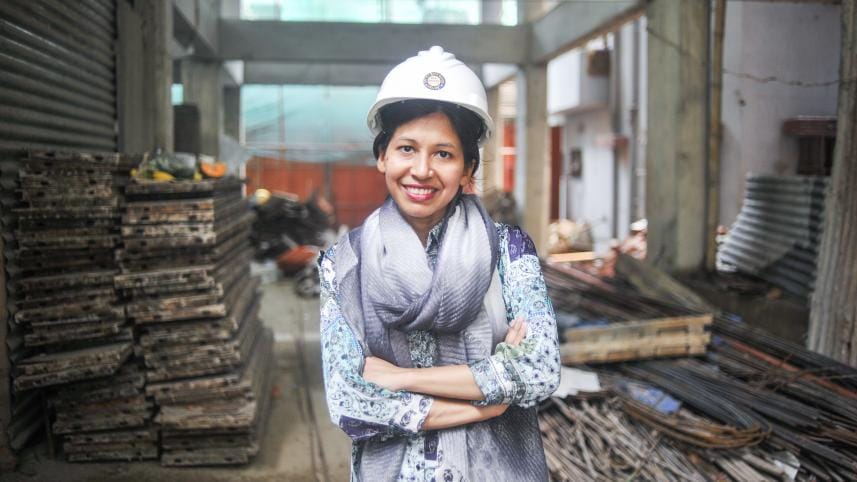Priyanka Das breaks career norms for civil engineers, one floor at a time

From towering skyscrapers to sprawling bridges and intricate road networks, civil engineering is a field that shapes the physical world around us. However, despite its critical role in society, this field remains a male-dominated profession, where women are largely underrepresented.
Those who do enter the field often face unique challenges that discourage them from pursuing long-term careers, particularly in site-based roles. When Priyanka Das entered this field with a master's degree in structural engineering from Sweden, this widespread inequality distressed her.
And so, she decided to fight back and carve a niche for herself in civil engineering.
"It was my father's wish to make me a civil engineer. I think I was not mature enough to take life's most important decision at that time, so I let my father decide for me," Das says.
Born and raised in Chittagong, Priyanka completed her SSC and HSC there before securing admission to the Bangladesh University of Engineering and Technology (BUET) in 2005 based on her merit and choice.
Graduating in February 2011, she began her professional journey with a developer company in Chittagong. From 2015 to 2017, Das pursued her master's in structural engineering in Sweden through the prestigious "William Chalmers Scholarship." This experience broadened her horizons and equipped her with advanced skills and knowledge.
Now, working as an assistant manager at Confidence Infrastructure PLC, Das is addressing the bias that leaves women feeling undervalued and unsupported.
"When I worked in Studio Dhaka, my assigned duty was to make site supervision before casting any structural elements like beams, columns, slabs, and foundations," she recalls.
Das identifies several barriers that prevent women from entering civil engineering.
"I think the main barrier would be the job markets, which are still restricted to male professionals," she says.
"Most civil-based companies still write 'Only males are allowed to apply' even for the position of 'structural engineer'."
She similarly points out societal beliefs that deem women unsuitable for exterior job duties, a critical component of civil engineering.
To encourage more women to consider careers in civil engineering, Das advocates for a more open-minded job market.
"If women see they are being appreciated by the construction sector, they will be more interested in having their career in civil engineering," she asserts. Enhancing site environments, including sanitation systems, is essential. "Most importantly, if women are accepted by the site with a favourable environment, their number will rise accordingly."
Improving the conditions on construction sites can make them more welcoming for women. This includes ensuring safety protocols are rigorously followed, providing appropriate facilities, and offering protective gear designed for women.
Das's advice to young women interested in civil engineering is motivational and practical.
"Life is all about how we work for our dreams. If we have interests in something, we can do our best there," she encourages. "If we just think what others will say, we can't go far."
So, how does she maintain a work-life balance amidst these continuous site visits and hectic schedules?
"I am a workaholic and I make to-do lists at the beginning of the week," Das shares. By dividing tasks among team members and holding short morning meetings, she ensures efficient workflow. She practices mindfulness, takes regular breaks, and indulges in leisure activities during holidays to maintain a healthy work-life balance.
Looking ahead, Priyanka envisions a more inclusive civil engineering industry. "It is high time the notion of gender discrimination should be eradicated from the root" she emphasises. Improving site environments with proper safety equipment, changing job market policies, and integrating construction training during university education are some of her proposed strategies.
Of course, the underrepresentation of women in civil engineering is a complex issue rooted in cultural norms, gender bias, and challenging work environments. But stories like Priyanka Das inspire us to continue pushing boundaries and creating opportunities for women in all fields.
So, let us strive for a world where every woman feels supported, respected, and inspired to reach her full potential — paving the way for future generations to build upon this legacy of progress and equality.



 For all latest news, follow The Daily Star's Google News channel.
For all latest news, follow The Daily Star's Google News channel.
Comments